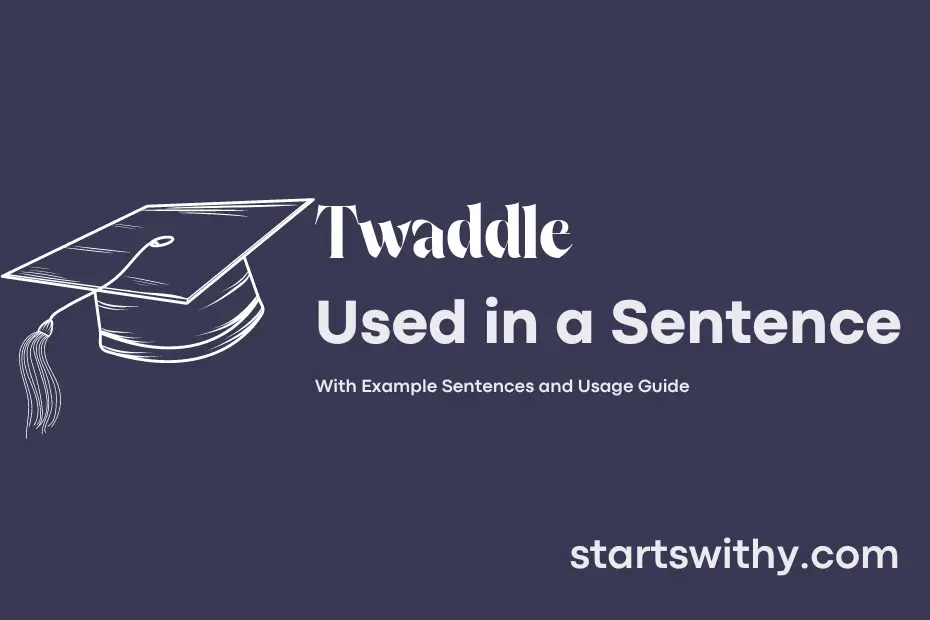Have you ever come across the term “twaddle” and found yourself puzzled by its meaning? In simple terms, twaddle refers to nonsensical or trivial talk or writing that lacks substance or value.
This word is often used to describe empty chatter or meaningless ramblings that contribute little to a conversation or argument. It is typically associated with idle gossip or superficial discussions that add no real depth or insight.
7 Examples Of Twaddle Used In a Sentence For Kids
- Twaddle is silly talk that doesn’t make sense.
- I don’t want to listen to twaddle, I want to hear a good story.
- The teacher told us not to talk twaddle during class.
- Let’s play a game and try to come up with our own twaddle sentences!
- I like to make up funny twaddle stories with my friends.
- When we’re bored, we sometimes start talking twaddle to make each other laugh.
- I learned that it’s important to speak clearly and not just say twaddle.
14 Sentences with Twaddle Examples
- Twaddle is often found in poorly researched academic papers.
- It’s important to avoid twaddle when writing your college essays.
- The professor criticized the student’s presentation for being full of twaddle.
- Reading too much twaddle can negatively impact your critical thinking skills.
- When preparing for exams, focus on studying relevant material instead of indulging in twaddle.
- Group discussions can help students filter out unnecessary twaddle from their thoughts.
- It’s crucial to listen actively in class and ignore any distracting twaddle.
- The student’s argument was weak and filled with meaningless twaddle.
- Stay away from websites that promote fake news and twaddle disguised as facts.
- Classroom debates should be productive and focused on facts, not twaddle.
- Engaging with diverse perspectives can help you identify twaddle in your own arguments.
- As responsible students, we must challenge twaddle and misinformation in academic settings.
- Establishing a strong foundation in critical thinking can help you sift through twaddle in the information age.
- Developing a habit of questioning sources will protect you from falling for twaddle spread online.
How To Use Twaddle in Sentences?
To use the word Twaddle in a sentence, simply insert it where you would normally use synonyms like “nonsense” or “gibberish”. Twaddle is a term used to describe foolish or trivial speech or writing.
For example, you may say, “I can’t stand listening to his constant twaddle about conspiracy theories.” In this sentence, twaddle replaces the word “nonsense” to convey that the speech is not worth listening to.
Another way to incorporate twaddle into a sentence could be, “Don’t waste your time reading that article, it’s just a bunch of twaddle.” Here, twaddle is used to dismiss the writing as trivial or unimportant.
When using twaddle in a sentence, remember its negative connotation. It is typically employed to criticize or belittle someone’s speech or writing as being silly, pointless, or lacking substance.
By practicing using twaddle in different sentences, you will become more comfortable incorporating it into your everyday vocabulary. This will help you effectively convey your thoughts and opinions using a unique and expressive term.
Conclusion
In conclusion, sentences filled with twaddle are convoluted, unclear, and often lack substance or meaning. These sentences are characterized by their excessive use of words that do not contribute to the main point, making them difficult to comprehend. By avoiding twaddle in writing, communication can be more effective, concise, and impactful.
Clear and concise communication is key in conveying ideas efficiently and ensuring understanding. Avoiding twaddle in sentences can help in achieving this clarity, allowing the message to be easily grasped by the reader or listener. By focusing on meaningful and relevant information, one can effectively communicate thoughts, opinions, and information without getting lost in unnecessary details or confusing language.



